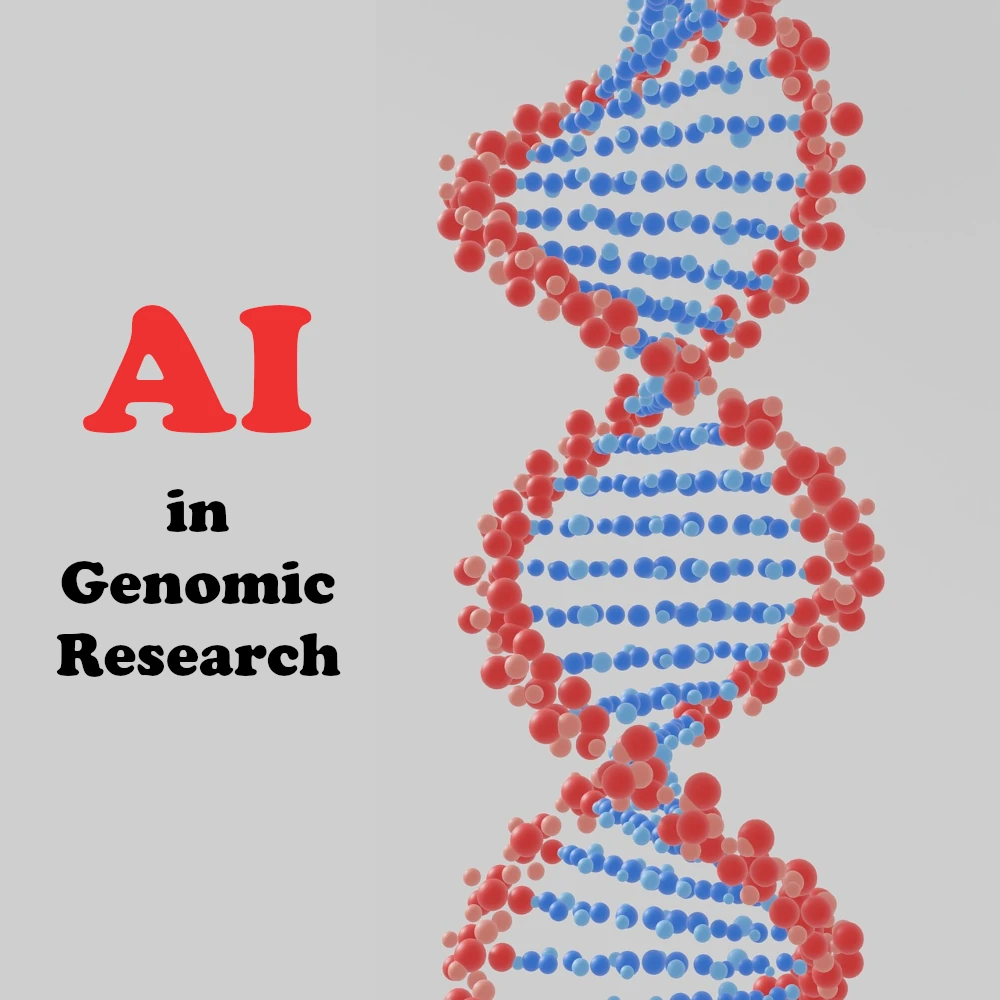Genomic research has been at the forefront of scientific advancement, unlocking the secrets of our DNA and providing insights into the very essence of life itself. Understanding the genetic code has immense implications for human health, and Artificial Intelligence (AI) is playing a pivotal role in revolutionizing genomic research. In this blog, we delve into the profound impact of AI on genomics and explore how it’s reshaping our understanding of genetic diseases.
The Genomic Revolution
Genomics, the study of an organism’s entire DNA sequence, has been a game-changer in the field of genetic research. It has allowed scientists to decipher the intricate language of genes and uncover their role in health and disease. With the Human Genome Project’s completion in 2003, we gained a blueprint of the human genome, but the challenge remained—interpreting this vast genetic code.
Artificial Intelligence Transforming Genetic Research

Artificial Intelligence, with its remarkable ability to process and analyze vast datasets, stepped in to tackle this challenge. Here’s how AI is transforming genetic research:
1. Data Processing and Analysis
Genomic data is incredibly complex, comprising billions of DNA base pairs. AI algorithms excel at sifting through this data to identify patterns, variations, and potential disease markers. It can analyze genetic sequences at speeds unattainable by human researchers.
2. Identification of Genetic Variants
AI helps identify genetic variants associated with diseases. For instance, in cancer research, AI can pinpoint specific mutations that drive tumor growth. This knowledge is crucial for developing targeted therapies.
3. Personalized Medicine
AI-driven genomics enables the development of personalized treatment plans. By analyzing an individual’s genetic makeup, doctors can prescribe medications tailored to their unique genetic profile. This approach is more effective and reduces adverse reactions.
4. Drug Discovery
AI accelerates drug discovery by predicting how drugs interact with specific genes. This speeds up the development of new treatments, potentially saving lives.
5. Genomic Testing
Genomic testing, a cornerstone of genetic research, has been enhanced by AI. This includes techniques like genetic methylation tests.
Real-World Applications of AI in Genomic Research
AI is revolutionizing genomics by using machine learning to identify cancer types from liquid biopsies. This is a paradigm shift in cancer diagnosis, as it allows clinicians to accurately detect specific cancer types and develop tailored treatment strategies without the need for invasive tissue biopsies.
Liquid biopsies are a simple and non-invasive way to obtain genetic information from cancer cells. By analyzing liquid biopsies with the precision of machine learning, AI can identify cancer cells and determine their type with high accuracy. This development not only increases the speed and accuracy of cancer diagnosis, but also unlocks valuable genomic insights that can be used to improve patient care.
AI is transforming genomics by utilizing facial analysis AI programs to accurately identify genetic disorders through the analysis of people’s faces. This innovation exemplifies how AI is revolutionizing genomics by offering a non-invasive and accessible method for early and accurate diagnosis of genetic disorders, thereby advancing personalized medicine and increasing accessibility to genetic healthcare.
Genetic Anomalies Detection
Artificial intelligence (AI) accurately identifies genetic anomalies. AI-based technologies use advanced algorithms to analyze various medical data, including genetic information, images, and clinical records, to detect and diagnose genetic disorders. These AI systems have shown great promise in identifying anomalies in newborns and individuals of all ages, making it possible to intervene early and provide the appropriate medical care. Additionally, AI can be used to detect congenital surgical diseases, further emphasizing its potential to revolutionize genetic anomaly detection in healthcare settings.
Drug Discovery
DeepGenomics is a company that uses artificial intelligence to advance the development of new drugs. Its main focus is on exploring the intricacies of RNA molecules, the main components of our body. Through their innovative technology, they unravel the mysteries of how RNA works, enabling the discovery of modern medicines based on this understanding. In a nutshell, deep genomics uses AI to tackle complex challenges and design better treatments for various diseases.
AI’s Contribution in Disease Understanding
Artificial Intelligence (AI) has emerged as a powerful tool in the field of genetic research, significantly enhancing our ability to understand and combat diseases. Let’s explore how AI is poised to improve our understanding of “Orkney Cancer Gene,” “MTHFR Gene Mutation Symptoms,” and “Genetic Methylation Tests.”
Orkney Cancer Gene
Recent genetic research has uncovered a distinctive cancer-causing gene variant prevalent among individuals with ancestral connections to the Orkney Islands. This gene variant is associated with a higher risk of developing breast and ovarian cancer. Approximately one in 100 people with Orkney ancestry carries this specific BRCA1 gene variant.
The discovery of this Orkney cancer gene has led to community testing programs to identify carriers and provide early intervention. With the aid of AI technology, we can efficiently detect Orkney disease.
1. Early Detection: AI algorithms can analyze large datasets to identify individuals carrying the specific BRCA1 gene variant associated with a higher risk of breast and ovarian cancer. This enables early detection and intervention, potentially saving lives.
2. Risk Assessment: AI-driven risk assessment models can evaluate an individual’s genetic makeup and lifestyle factors to provide personalized cancer risk assessments. This empowers individuals to make informed decisions about their health.
3. Targeted Therapies: AI helps match patients with the Orkney cancer gene variant to targeted therapies. By understanding the genetic basis of the disease, treatment options become more precise and effective.
MTHFR Gene Mutation Symptoms
One of the genes of interest in genetic research is the MTHFR gene. This gene encodes an enzyme involved in folate metabolism. Mutations in the MTHFR gene can lead to health issues, and symptoms may include:
- Neural Tube Defects: MTHFR mutations have been associated with neural tube defects in babies.
- Cardiovascular Problems: Some studies suggest a link between MTHFR mutations and cardiovascular diseases.
- Mental Health Issues: MTHFR mutations may contribute to mental health conditions like depression and anxiety.
- Symptom Prediction: AI can analyze a patient’s genetic data to predict the likelihood of experiencing MTHFR gene mutation symptoms, such as neural tube defects or cardiovascular issues. This proactive approach allows for early intervention and management.
- Treatment Customization: AI-driven genomic analysis can guide healthcare providers in tailoring treatment plans based on an individual’s MTHFR gene profile. Personalized medicine becomes more accessible, optimizing treatment outcomes.
- Research Acceleration: AI accelerates research into the MTHFR gene and its implications. It can identify novel associations between gene mutations and health conditions, paving the way for new therapies.
Genetic Methylation Tests
Genetic methylation is an epigenetic modification that involves the addition of a methyl group to DNA. This process plays a crucial role in gene regulation. Genetic methylation tests examine the methylation patterns in an individual’s DNA. Here’s why these tests are important:
- Disease Risk Assessment: Methylation patterns can indicate an individual’s susceptibility to certain diseases. AI helps interpret these patterns and assess disease risk.
- Cancer Detection: Abnormal DNA methylation patterns are often associated with cancer. AI can detect these patterns, aiding in early cancer diagnosis.
- Personalized Treatment: Methylation tests can guide the selection of personalized treatment plans based on an individual’s epigenetic profile.
- Enhanced Interpretation: Genetic methylation tests generate vast amounts of data. AI algorithms excel at interpreting these complex patterns, identifying epigenetic markers associated with diseases.
- Disease Prediction: AI can predict an individual’s disease risk based on their methylation patterns. It’s particularly valuable for conditions where epigenetics plays a pivotal role, such as cancer and mental health disorders.
- Personalized Interventions: By understanding a patient’s methylation profile, AI can recommend personalized interventions, such as lifestyle modifications or targeted therapies. This approach maximizes the effectiveness of healthcare strategies
The Future of Genomic Research
Artificial Intelligence has opened new frontiers in genomics, allowing us to decode the secrets of our genes with unprecedented speed and precision. As AI continues to evolve, so does our ability to understand and combat genetic diseases. Genomic research, AI-driven and ever-advancing, holds the promise of personalized medicine and a healthier future for all.
The convergence of genomics and AI is not just transforming genetic research; it’s reshaping our understanding of human biology and disease. As we unlock the mysteries of our DNA, we move closer to a world where genetic diseases are better understood and more effectively treated. The potential impact on healthcare is profound, offering hope to countless individuals and families affected by genetic conditions.

About Rezaid
Rezaid Global is a Digital Marketing Agency that creates and executes cutting-edge digital strategies for companies far and wide. Our team creates custom software and online promotion packages designed specifically for small enterprises (SMEs) operating within Manchester and beyond, with customized packages to match their business needs.
MolMart is a company dedicated to assisting individuals and families in making crucial life decisions. They offer advanced solutions for the prevention and diagnosis of genetic diseases. The company is at the forefront of utilizing rapidly evolving technologies like Genomics, Artificial Intelligence (AI), and Machine Learning to develop sophisticated, high-end solutions tailored to the needs of their customers.


